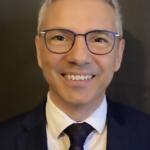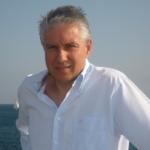“A new experiential concept in preventive healthcare”
A sport-health-tourism concept with the accent on innovation: that is the aim of the MySens project thought up at Sedan by the president of the Sedan Ardennes Sport Club, Marc Dubois, and the researcher in neuroscience, Sébastien Lasnier. The project has great potential, in the fields of research, sport (grassroots and/or top level) and health.


Marc Dubois, president of the Sedan Ardennes Sport Club
Sébastien Lasnier, researcher in neuroscience
Where did the MySens concept come from?
MD: The Aplus group which I founded and of which I am president has been involved in building and running EHPADs (care homes) and well-being establishments combining hotel and spa facilities for 30 years. We observe considerable differences in personal health practices among the clients in our establishments. We see that acquiring good habits, paying attention to one’s body and keeping healthy all through life takes on more importance with advancing age. So, we have evolved measures and a philosophy that I call “egology”, which consists of optimising the relationship between the inhabitant and their environment on the one hand, and the preservation of health capital on the other. We apply this concept in our establishments, on several levels (environmental, sanitary and social). MySens is the extension of this commitment. Our ambition is to create hotel complexes with a preventive health centre for the public, a centre specialising in sport science and a spa, and to put new technologies at the heart of the project. It represents a new experiential concept in tourism, with a scheme for “transforming” the visitors and their behaviour after their stay. The first centre will be opening in Sedan, in the training centre of the Sedan Ardennes Sport Club (CSSA), a French football club with a rich history of which I am proud to be president. The opening is planned for 2023. Another project has been launched in the south of France and we are working on exporting the concept.
“Optimising physical and mental capacity”
What are the technological innovations proposed by MySens?
SL: Our tools aim to allow visitors to preserve as good a state of health as possible. They will have access to the two centres in the MySens complex, the preventive health centre and the centre specialising in sport and sport science, in an interconnected way.
The “Health” centre will be based on maintaining health. Our current system is mainly based on curing/caring. We want to change this approach. We favour a scheme founded on preventing and looking ahead, using data generated by the visitors. We want to ensure that people pay attention to their health, by using evaluation and check tools which will be as invisible as possible, such as connected devices, virtual reality and serious game. Thus, when visitors are relaxing or doing sport, we will collect certain data which artificial intelligence will use to provide useful indications to the staff. The MySens theme is: “The destination is me”. People will discover themselves. We will also provide more conventional medical reports, such as blood tests, but always taking into account our environment and the factors that influence our health and our organism.
Links will be built with the “Sport” centre. For example, we will offer personalised assessments and define a programme for a gradual return to physical activity. For people who already do sport, a tailor-made programme can be defined with a view to better performance, with specific, high-level equipment. The aim is to optimise the person’s physical and mental capacity, be they champions or ordinary citizens. The supervising staff will be health professionals and instructors in adapted physical activity. They will be coaches and not doctors in white coats.
How long do you expect people to stay?
MB: Several options will be available, adapted to tourist visits. This will usually mean 2, 4, or 6 days.
SL: Even during a two-day stay we can provide a person with effective programmes and solutions. The idea is that they will take these solutions home with them, that they will leave with methods that will help them in their daily life.
How can this be followed up reliably?
SL: We are going to use digital health technology and in particular a digital health passport, allowing its holder to recover all their personal data. We will use this passport to centralise the data collected during a person’s stay along with other existing data in order to support each visitor when they leave, to provide personalised advice, to offer tele-consultations and nutritional advice. All this will obviously be secure and fully confidential, with each person’s agreement.
“Using the appeal of football and getting the region moving”
The project falls into the category of preventive healthcare. Where does France stand on this issue today?
SL: For us, primary prevention is the most important thing. It can help avoid diseases and conditions. In France, the President of the Republic himself has said that although France is very good at treating illnesses, it is less good at preventing them. In France there is a 13-year gap in life expectancy between the richest and poorest members of society. We have one of the highest levels in Europe of avoidable premature deaths. This situation is linked to social inequality and access to information. Our system dates from 1945, and is primarily based on caring. Yet prevention is an effective treatment. Every 1€ invested in preventive healthcare saves the health system 14€.
What can you do to reduce social inequality?
SL: Our programmes are accessible in our MySens centres, but we aim to make the technology widely available. We intend to roll out mini-MySens throughout France, which will separate our services from our holidays.
MB: The project is also aimed at helping young people in the Sedan region, not just footballers from the CSSA. 80% of 11 to 17-year-olds do less than 60 minutes of physical activity a day. The tools we are developing are also aimed at joining the fight against the sedentary lifestyle. We will use the appeal of football and the CSSA to help young people and others who are remote from doing any physical activity to take up suitable regular activity again.
SL: The idea is to get through to young people that they are going to have fun, and get away from over-medicalised programmes. If we can get them to come to a specific environment where they can meet their friends, relax and learn things, I think we will be able to make a big impact.
The project will be part of the Sedan region. What synergies are you looking for?
MB: We are in regular contact with local authorities and companies in the region. As an example, we are associated with the nearby hospitality and catering school, which provides expertise in the hotel and restaurant trade. The Regional Health Agency is also interested in what we are doing. We want to make this project available to stakeholders. We will go much further than just a tourist project in a football club.







 INSCRIPTION
INSCRIPTION CONTACT
CONTACT FACEBOOK
FACEBOOK